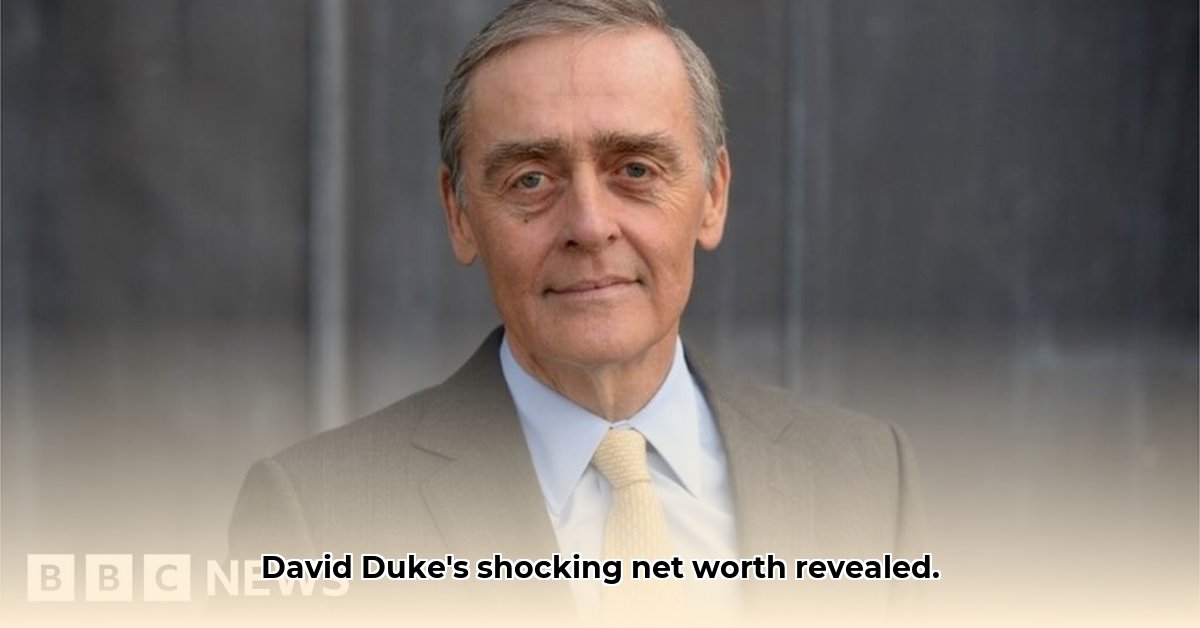
David Duke's name is synonymous with white supremacy and hate. But what is the financial reality behind this notorious figure? Estimates place his net worth at approximately $600,000, a figure that belies a complex narrative intertwining his political career, extremist ideology, and even a felony fraud conviction. This article delves into the murky world of Duke's finances, exploring how his hateful actions intersected with his personal wealth and the broader implications for combating extremism.
The Rise and Fall (and Rise Again) of a Hate Figure
David Duke’s journey began with his involvement in the Ku Klux Klan (KKK). He strategically transitioned this association into a political career, culminating in election to the Louisiana House of Representatives. This platform amplified his extremist views, solidifying his image as a prominent voice of American neo-Nazism. Subsequent campaigns for higher office, though unsuccessful, further cemented his influence within extremist circles. How did this political trajectory translate into financial success? The answer is multifaceted and, at times, opaque.
The Complexities of David Duke's Finances
Determining David Duke's precise net worth remains challenging. While estimates hover around $600,000, directly linking this figure to his hateful ideology proves difficult. This difficulty stems from the often-unclear and ethically questionable nature of several potential income streams. The available data, however, strongly suggests a link between his activities and his financial standing.
His 2002 felony fraud conviction significantly impacted his financial situation, yet he maintains a degree of financial stability. This raises questions about the adaptability of his funding strategies and the resilience of his financial network. Did his conviction force a shift in revenue generation, or did other sources maintain his financial position?
The 2002 Fraud Conviction: A Turning Point?
Duke's 2002 conviction for felony fraud dramatically altered his financial landscape. This legal setback undoubtedly reduced his immediate earning potential and jeopardized previously accessible sources of funding. Nevertheless, his subsequent financial stability suggests the existence of alternative or persistent income streams. The conviction, however, marked a significant shift in his operational methods, forcing adaptation in his financial strategies.
Online Influence and Its Financial Ramifications
The internet provided Duke with an unparalleled platform to disseminate his ideology. His online presence, encompassing book sales, donations, and merchandise, likely contributed significantly to his financial standing. Quantifying the exact financial impact of his online activities remains difficult, but it's undeniable that his hateful messages reached a broad global audience and generated potential revenue.
Analysis and Conclusions: A Nuance of Hate and Profit
Estimating David Duke's net worth requires careful analysis of fragmentary evidence. The lack of transparency and the often-illegal nature of his activities make a precise figure elusive. However, available data points towards a moderate level of financial success, raising fundamental questions about the intersection of hate speech and financial gain. Did his notoriety and infamy, despite hindering his political ambitions, paradoxically enhance his earning potential through alternative channels?
Key Takeaways:
- David Duke's career exemplifies the evolution and adaptability of white supremacist movements.
- His 2002 fraud conviction, while impactful, did not entirely sever his financial resources.
- His online presence and international networks continue to exert considerable influence.
Policy Recommendations: Preventing Future Dukes
David Duke's story serves as a cautionary tale, highlighting vulnerabilities within systems that allow individuals to profit from hate speech. Addressing this requires a multi-pronged approach:
Strengthened campaign finance regulations: More robust regulations are crucial to prevent extremists from exploiting political systems for personal financial gain. Increased transparency and stricter enforcement are essential.
Targeted prosecution of financial crimes linked to extremism: Aggressive prosecution of financial crimes connected to extremist activities is critical in dismantling their operations and reducing their funding.
Enhanced social media accountability: Social media platforms must strengthen content moderation policies to limit the spread of hate speech and diminish the financial incentives associated with its creation and dissemination.
The fight against extremism necessitates a comprehensive understanding of its financial underpinnings alongside its ideological roots. Further research is needed to fully unravel the complexities of David Duke's financial dealings and inform effective countermeasures. This includes investigating his pre-conviction income streams and analyzing his online activities to accurately quantify their financial impact. Only through a meticulous and comprehensive approach can we hope to prevent the rise of future figures like David Duke.